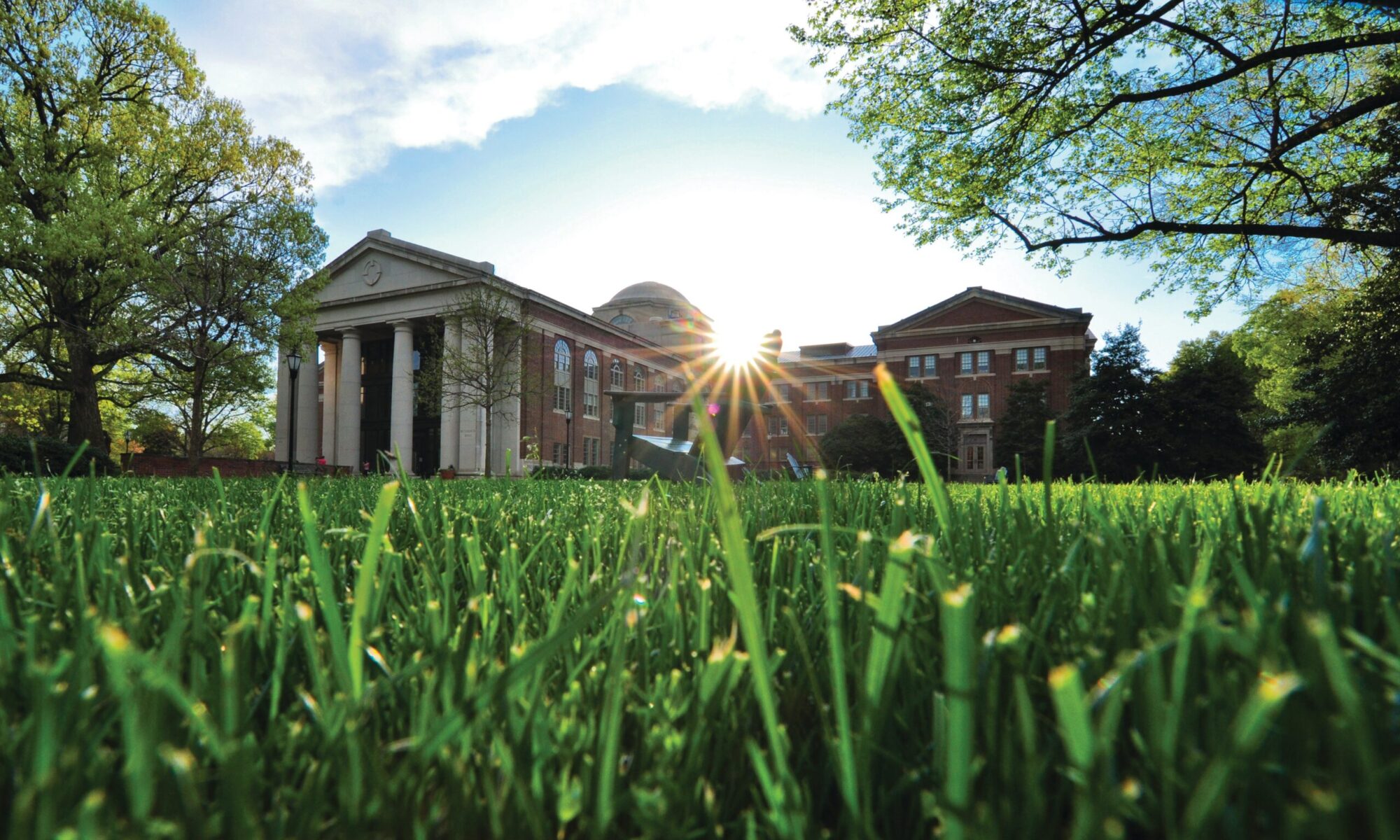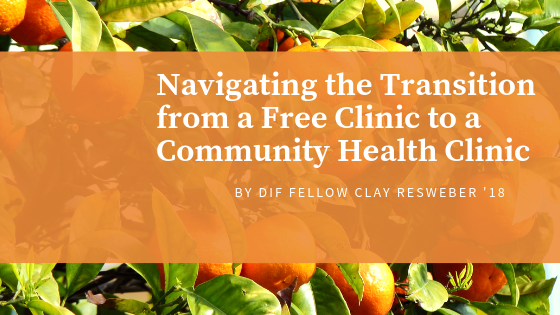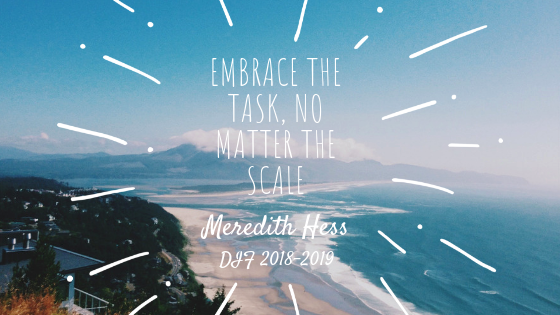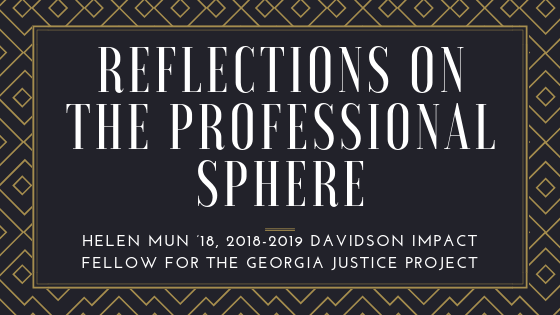This blog was written by Clay Resweber ’18, 2018-2019 Davidson Impact Fellow for the Charlotte Community Health Clinic (CCHC).
This might seem obvious, but one
of the best parts of being a Davidson Impact Fellow is having the opportunity
to integrate yourself into an organization and participate in its operation. In
my experience at Charlotte Community Health Clinic (CCHC), I feel like my
fellow coworkers and leadership team have taken many steps towards teaching me
about the mission of the clinic, our operating procedures, and the history of
our organization. The clinic’s mission and operations are on the minds of our
staff every day as we find ways to better treat and relate to our patients, but
one aspect that often gets lost in the daily routine is the story of where are
our clinic came from. This history is interesting in itself, and helps to
explain the obstacles that our clinic faces today.
In the world of healthcare, there are a few different types of practices that are designed to cover different populations of people. On one end of the spectrum you have private practices, clinics run by physicians which have a lot of freedom in deciding what procedures they treat, who they want to see, and what insurance types they will accept. Hospitals also exist towards this end of the spectrum, but often have restrictions and guidelines on how they can operate that provides them less freedom than a private practice would. On the other end of the spectrum exist free clinics, which, from my understanding, exist due to the virtues of volunteers and are designed to treat uninsured patients. The nature of their target population means that the clinic will not be fully reimbursed for the services they offer their patients, which restricts the types of procedures they can provide, their hours of operation, the number of patients they can see, and a multitude of other factors of which I am unaware. These types of clinics exist because of the stewardship and service of dedicated staff and providers, which often reflects in the quality of care and atmosphere found within them.
Somewhere in between a free clinic and a hospital or private practice is the world of federally qualified health centers (FQHC), often referred to as community health clinics. FQHC’s first appeared in America in the 1960s and were inspired by the health clinics of South Africa, which experienced more effective outreach and treatment by integrating themselves into the communities they served. It took a while for a system inspired by these South African clinics to take off in the US, but eventually, under the governance of the Health Resources and Services Administration (HRSA) within the Department of Health and Human Services, the government set up a program to follow the example of our South African counterparts. These FQHC’s receive grants from HRSA to help fund the cost of their operations. Further, HRSA offers many other grants for specific programs that FQHC’s can apply for based on their specific services and patient populations. Since they are designed to integrate themselves within the communities they serve, FQHC’s can and do serve patients of any payer type, including uninsured patients, Medicaid patients, Medicare patients, and 3rd party insurance patients. Uninsured patients are responsible for a copay based off of their federal poverty level (FPL) designation to provide them with some investment in their healthcare. The grants that FQHC’s receive from HRSA are designed to offset the cost of these patients, but it is important to emphasize that community health clinics in America are able to provide primary care and references to specialty care to patients of all payer types.
What makes CCHC’s situation unique is that before becoming an FQHC 2 years ago, they operated as a free clinic for over a decade. This means that the clinic had a large population of uninsured patients using their services, used volunteer providers that completed services as they could, and had no federal reporting requirements. Since community health clinics have to report to the federal government and offer a wider range of services than a free clinic, the transition caused a large turnover in providers and staff which has now stabilized. However, one aspect of the change that we still grapple with today is in the payer mix of our patient population. Although we receive grants, both from federal and private sources, to help offset the cost of serving our uninsured patients, FQHC’s need to have a diverse payer mix including Medicaid, Medicare, and privately insured patients in order to be sustainable. Due to our history as a free clinic, we maintained a large percentage of uninsured patients that persists years after the switch.
Although all of
us here at CCHC are happy to serve all types of patients, the fact remains that
in order to remain sustainable and grow as an organization, we must find ways
to attract other types of payers. Doing so has proved to be challenging, but we
have undertaken many initiatives that will hopefully help us accomplish our
objective of diversification. Learning about these projects has provided an
interesting opportunity to learn which populations usually have different types
of insurance, which paints a telling image of the American healthcare map. We
have partnered with the local Men’s Shelter and Urban Ministries to place one
of our nurses in Charlotte’s homeless shelters and provide us intimate access
with the city’s homeless population, who often have Medicaid coverage. CCHC has
also pursued partnerships with different elderly organizations in an attempt to
reach a population of people that are provided with Medicare coverage.
Initiatives to establish our clinic in schools allow us to attract more
school-aged children, who enjoy Medicaid coverage under CHIP. Meanwhile, our
uninsured patients are largely Hispanic adults, but represent a diverse
population of Charlotte citizens.
Having worked in
the clinic for 6 months, learning about these initiatives and operations has
made a huge impact on informing me about America’s healthcare situation. The
government programs we have in place show some of our most vulnerable
populations, many of which all of us have some connection to, and the lengths
that our representatives have taken to provide for them. Our uninsured patients
show another part of the picture, of those who are vulnerable and do not
receive assistance. Figuring out how to reach each of these very different
groups of people is a unique challenge, but one that lies close to the heart of
a clinic such as CCHC, which is dedicated to serving people in a city such as
Charlotte. I quickly realized that understanding the vision and initiatives at
CCHC requires an understanding of our history and free clinic roots, which has
been fun and interesting to learn about in itself. Using these lessons to
connect CCHC to the larger picture of American healthcare has been a real
privilege, one that I hope to take with me in a career as a healthcare
provider.















